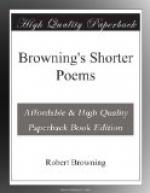As this morning I gather the fragments, alone with my sheep,
And still fear lest the terrible glory evanish like sleep!
For I wake in the gray dewy covert, while Hebron, upheaves
The dawn struggling with night on his shoulder, and Kidron retrieves
Slow the damage of yesterday’s sunshine.
XV
I say then,—my
song
While I sang thus, assuring the monarch, and, ever
more strong,
Made a proffer of good to console him—he
slowly resumed.
His old motions and habitudes kingly. The right
hand replumed
His black locks to their wonted composure, adjusted
the swathes
Of his turban, and see—the huge sweat that
his countenance bathes, 210
He wipes off with the robe; and he girds now his loins
as of yore,
And feels slow for the armlets of price, with the
clasp set before,
He is Saul, ye remember in glory,—ere error
had bent
The broad brow from the daily communion; and still,
tho’ much spent
Be the life and bearing that front you, the same,
God did choose,
To receive what a man may waste, desecrate, never
quite lose.
So sank he along by the tent-prop, till, stayed by
the pile
Of his armour and war-cloak and garments, he leaned
there awhile,
And sat out my singing,—one arm round the
tent-prop, to raise
His bent head, and the other hung slack—till
I touched on the praise 220
I foresaw from all men in all time, to the man patient
there;
And thus ended, the harp falling forward. Then
first I was ’ware
That he sat, as I say, with my head just above his
vast knees
Which were thrust out each side around me, like oak
roots which please
To encircle a lamb when it slumbers. I looked
up to know
If the best I could do had brought solace: he
spoke not, but slow
Lifted up the hand slack at his side, till he laid
it with care
Soft and grave, but in mild settled will, on my brow:
thro’ my hair
The large fingers were pushed, and he bent back my
head, with kind power—
All my face back, intent to peruse it, as men do a
flower. 230
Thus held he me there with his great eyes that scrutinized
mine—
And oh, all my heart how it loved him! but where was
the sign?
I yearned—“Could I help thee, my
father, inventing a bliss,
I would add, to that life of the past, both the future
and this;
I would give thee new life altogether, as good, ages
hence.
As this moment,—had love but the warrant,
love’s heart to dispense!”
XVI
Then the truth came upon me. No harp more—no song more! outbroke—




